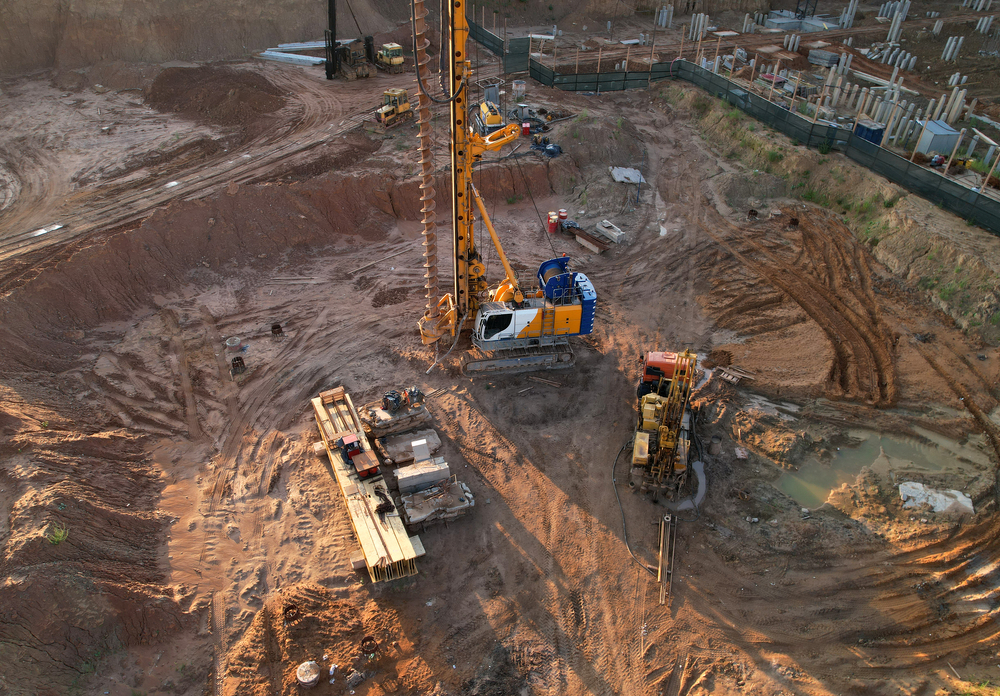What Does Geotheta Mean?

A geotechnical engineer is a specialized civil engineer that concentrates on the habits of soil, rock, and other products discovered under the Earth's surface area. They use clinical concepts and design strategies to analyze the properties and behavior of these materials to sustain the safe and reliable design, building and construction, and upkeep of framework jobs.
They perform site investigations, accumulate examples, carry out lab tests, and examine information to assess the suitability of the ground for building and construction tasks - Geo Tech Engineer. Based on their findings, geotechnical engineers give suggestions for foundation layout, incline security, maintaining frameworks, and mitigation of geotechnical risks. They collaborate with various other professionals, such as engineers, architectural designers, and building groups, to ensure that geotechnical considerations are incorporated into the total job design and implementation
By evaluating the habits and buildings of soil and rock, they can determine possible geotechnical risks such as landslides, dirt negotiation, or slope instability. Their proficiency aids avoid failings or crashes that might endanger lives and building. Here are some comprehensive tasks and responsibilities of a geotechnical engineer: Website Examination: Geotechnical designers conduct site examinations to collect data on subsurface conditions.
They translate the data to understand the properties and behavior of the dirt and rock, including their strength, leaks in the structure, compaction attributes, and groundwater problems. Geotechnical Evaluation and Layout: Geotechnical engineers analyze the information accumulated during website examinations to assess the security and suitability of the site for construction projects. They do geotechnical estimations and modeling to assess aspects such as bearing ability, settlement, incline security, lateral planet stress, and groundwater flow.
The Greatest Guide To Geotheta
Structure Layout: Geotechnical designers play a vital role in developing structures that can safely sustain the desired structure. They examine the dirt problems and tons needs to determine the suitable foundation type, such as shallow structures (e.g., footings), deep structures (e.g (https://www.indiegogo.com/individuals/37984319)., piles), or specialized methods like dirt improvement. They think about variables such as settlement limits, birthing ability, and soil-structure communication to develop ideal foundation designs
They examine building and construction strategies, monitor website tasks, and carry out area assessments to verify that the style suggestions are complied with. If unforeseen geotechnical problems arise, they analyze the circumstance and provide recommendations for remediation or adjustments to the design. Danger Analysis and Reduction: Geotechnical designers examine geotechnical risks and dangers connected with the job site, such as landslides, liquefaction, or soil erosion.

Collaboration and Interaction: Geotechnical engineers work carefully with other specialists involved in a project, such as architects, structural designers, and building teams. Effective communication and collaboration are necessary to integrate geotechnical factors to consider into the total project design and building and construction procedure. Geotechnical engineers offer technical proficiency, response queries, and guarantee that geotechnical needs are met.
The Only Guide for Geotheta
Here are some sorts of geotechnical engineers: Foundation Designer: Structure designers specialize in making and evaluating structures for structures. They assess the soil conditions, lots needs, and site qualities to identify the most proper foundation kind and style, such as shallow structures, deep foundations, or specialized techniques like stack foundations.
They evaluate the elements influencing incline security, such as soil properties, groundwater problems, and incline geometry, and establish approaches to stop incline failures and reduce dangers. Earthquake Engineer: Quake engineers focus on evaluating and making structures to endure seismic pressures. They evaluate the seismic hazard of a website, examine soil liquefaction possibility, and develop seismic design standards to guarantee the safety and security and durability of frameworks during quakes.
They carry out area screening, collect samples, and assess the gathered information to characterize the dirt residential or commercial properties, geologic developments, and groundwater problems at a site. Geotechnical Instrumentation Engineer: Geotechnical instrumentation engineers focus on surveillance and gauging the behavior of dirt, rock, and frameworks. They install and keep instrumentation systems that keep an eye on elements such as dirt settlement, groundwater degrees, slope activities, and structural displacements to analyze performance and give very early cautions of prospective concerns.
Getting My Geotheta To Work
They tend to be investigative individuals, which implies they're intellectual, reflective, and analytical. They wonder, systematic, rational, logical, and sensible. Several of them are also social, implying they're kind, generous, participating, person, caring, helpful, empathetic, skillful, and friendly. Does this noise like you? Take our totally free profession examination to learn if geotechnical engineer is just one of your leading job suits.
In the office atmosphere, geotechnical designers use specialized software application tools to execute computations, create designs, and analyze information. They prepare reports, review job specs, communicate with customers and employee, and coordinate job tasks. The workplace setup supplies a helpful atmosphere for study, evaluation, and partnership with other professionals entailed in the project.
The smart Trick of Geotheta That Nobody is Discussing
They regularly go to job sites to carry out website examinations, evaluate geotechnical problems, and gather data for analysis. These sees entail traveling to different areas, sometimes in remote or challenging surfaces. Geotechnical engineers might perform soil tasting, conduct examinations, and monitor building activities to make sure that the geotechnical facets of the project are being carried out appropriately.
Geotechnical engineers likewise operate in specialized Get More Info geotechnical research laboratories. In these centers, they conduct experiments, perform examinations on dirt and rock samples, and assess the design properties of the materials. Geotechnical lab engineers work thoroughly in these settings, handling screening tools, running instruments, and tape-recording data. They team up with various other research laboratory team to ensure accurate and dependable screening outcomes.
Comments on “Not known Facts About Geotheta”